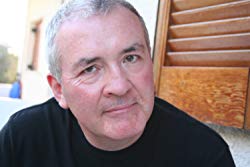Tony Bradman
, b. 1954
Tony Bradman is a British born author of children’s books and short fiction pieces. He was born in London and still lives there. He cites The Hobbit and the novels of Rosemary Sutcliffe as early influences on his love of reading (see here, accessed: July 4, 2018). After studying at Cambridge University he became a journalist, eventually writing reviews of children's literature for a magazine called Parents. He has been a children's author since the 1980s, and is arguably best known for his long-lasting series about Dilly the Dinosaur (1986–1994), which sold over two million copies globally. He earned renown for this series. His historical titles include Spartacus (with Tom Bradman), The Story of Boudicca, and Harald Hardnut and he has published a considerable number of retellings of traditional myths and legends.
He has published over seventy stand-alone books and four popular series. His work has been published by Methuen Publishing, Aldred A. Knopf, Puffin Books and Harper Collins.
Before dedicating his time fully to writing children’s literature in 1984, Bradman worked as a music writer and reviewer of children’s books.
Sources:
Official website (accessed: October 10, 2018)
Profile at the wikipedia.org (accessed: October 10, 2018)
Profile at the walker.co.uk (accessed: October 10, 2018)
Profile at the penguin.co.uk (accessed: October 10, 2018)
Bio prepared by Sonya Nevin, University of Roehampton, sonya.nevin@roehampton.ac.uk and Tikva Schein, Bar-Ilan University, tikva.blaukopf@gmail.com
Questionnaire
1. What drew you to writing / working with Classical Antiquity and what challenges did you face in selecting, representing, or adapting particular myths or stories?
I’ve always enjoyed the myths and legends of the Greeks, and have re-told quite a few. They’re great stories, and the main challenges are in getting the level right for younger children – and also dealing with some of the more extreme violence! There’s lots of gory stuff in the myths, and you need some jeopardy to generate suspense, but you have to be careful most to go too far.
2. Why do you think classical / ancient myths, history, and literature continue to resonate with young audiences?
The great myths and legends have lasted because they’re great stories, and they tell us a lot about what it means to be human. They’re stories about young characters facing overwhelming odds (Theseus and Jason), tales of betrayal and revenge (Electra and Medea). Even Hercules is more than just a hero… The stories are also embedded in European culture and the cultures of countries settled or influenced by Europeans…
3. Do you have a background in classical education (Latin or Greek at school or classes at the University)? What sources are you using? Scholarly work? Wikipedia? Are there any books that made an impact on you in this respect?
I did study Latin and Greek at school, and have tried to improve my skills in both languages. I read some of the original texts, but also good translations. For background I surfed the web – lots of websites (some good, lots not very good at all) – Wikipedia is always useful!
4. Did you think about how Classical Antiquity would translate for young readers, esp. in (insert relevant country)? How concerned were you with “accuracy” or “fidelity” to the original? (another way of saying that might be – that I think writers are often more “faithful” to originals in adapting its spirit rather than being tied down at the level of detail – is this something you thought about?)
For children it’s really a case of being “faithful” to the original – the originals are quite hard and violent, and can also be confusing. I’m very keen to re-tell the myths in a contemporary way, with lots of action and suspense and good characters and dialogue. And because the tales are so rich, that’s easier than it sounds.
5. Are you planning any further forays into classical material?
I’m writing a lot of historical fiction these days – I’m currently working on a story about the revolt of Boudica against the Romans in Britain – and I’ve always wanted to write the story with Telemachus as the central character.
Prepared by Tikva Schein, Bar-Ilan University, tikva.blaukopf@gmail.com
Records in database:



